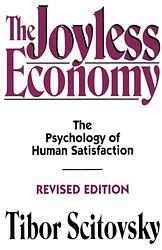The Joyless Economy by Tibor Scitovsky
This book challenges traditional economic theories that equate wealth with happiness, arguing that the pursuit of material gains often leads to a joyless existence. The author posits that economic growth does not necessarily result in increased satisfaction, as people adapt to new levels of comfort and pleasure, leading to a constant chase for more without genuine fulfillment. The text delves into the psychology of human desires, the role of culture in shaping consumption, and the importance of intellectual and aesthetic experiences in contributing to true well-being. It calls for a reevaluation of what constitutes real happiness and the need for economic policies that prioritize quality of life over mere quantitative expansion.
The 3418th greatest book of all time
Ranking Details:
Our ranking system awards points to books based on their appearance and position on curated lists. Here's how it works:
Unranked Lists: For lists without specific rankings, each book receives points equivalent to the list's weight. This approach recognizes the book's inclusion on prestigious lists.
Ranked Lists: Books on ranked lists receive points in two ways:
- Base Points: Initially, every book is awarded points equal to the list's weight, acknowledging its significance.
- Bonus Points: Additionally, books earn bonus points based on their ranking. The total bonus pool, equal to 100% of the list's weight, is distributed among the books, with higher-ranked books receiving more points.
Exponential Distribution: The distribution of bonus points follows an exponential model. This means the top-ranked book (#1) receives significantly more bonus points than those further down the list (e.g., #100). Our algorithm ensures that higher placements are rewarded more generously, reflecting the achievement of a top rank on any given list.
This scoring system ensures that each book's ranking reflects both its presence on multiple lists and its positions within those lists, providing a comprehensive measure of its acclaim and popularity.
Total Points: 114
Since this book was first published in 1976, there is a penalty of 3.2%. The age adjusted score is 110.35.
This is to prevent newer books from reaching super high on the ranked list of the greatest books of all time. The greatest books should also stand the test of time.
- score: 114 -- The Hundred Most Influential Books Since The War (WW2) (Weight: 114)

